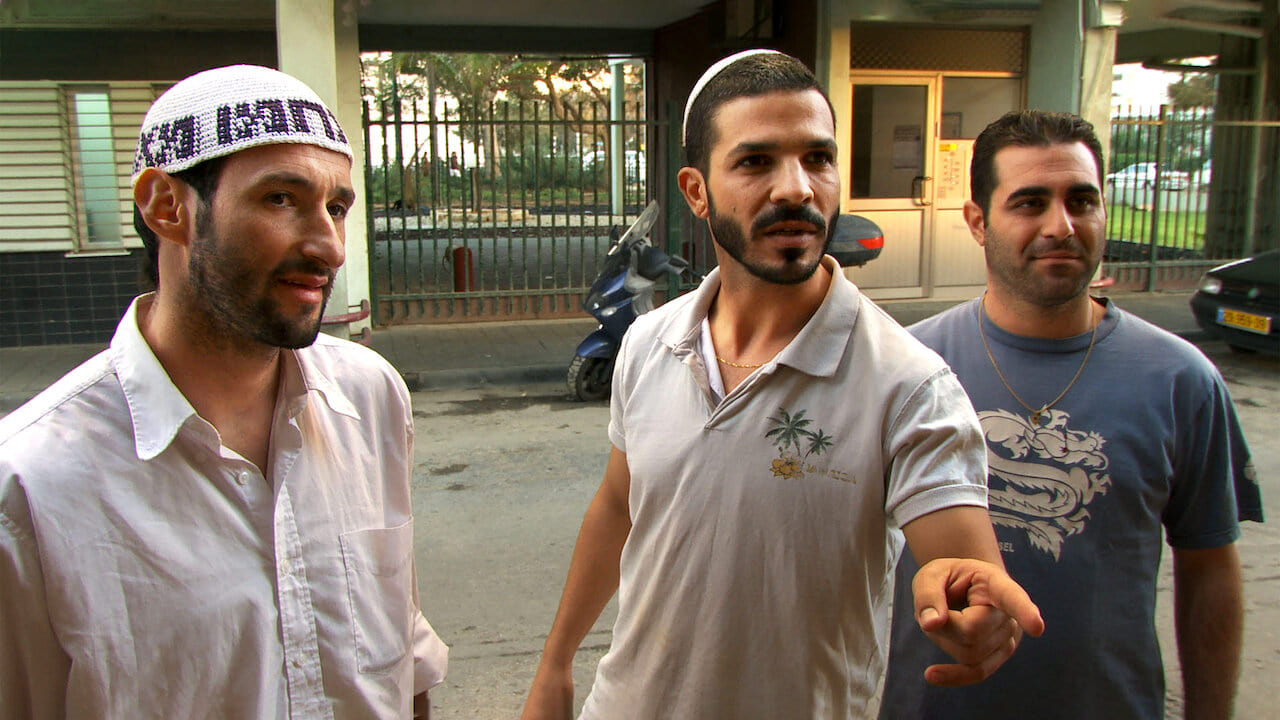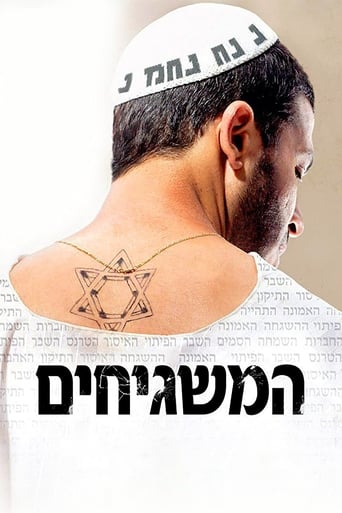



Purely Joyful Movie!
Pretty good movie overall. First half was nothing special but it got better as it went along.
View MoreClever, believable, and super fun to watch. It totally has replay value.
View MoreThis is a gorgeous movie made by a gorgeous spirit.
View MoreThe producers or the distributors decided to translate HaMashgihim with God's Neighbors for the English distribution of this film. I have a hard time to understand their intention, but I agree that the translation is not easy, as The Supervisors which would be the literal translation does not convey the whole function of the role that the violent gang of three young religious people who are in the center of the story take upon themselves - keeping the rules of decency and respect for religion in their neighborhood. While the supervisors have a role that is accepted in the more traditional Jewish society of keeping for example the rules of kosher, no such role would be but self-assumed in a mixed neighborhood like the one Bat Yam (south of Tel Aviv) described in the film. Their violence is not legal, but it is exits in a society where culture clashes are the rule - and some of them are well represented in this film - between the religious and the modern ways of life, between the born-Israelis and the immigrant new-comers, between Jews and Arabs. First time director Mani Yaesh not only succeeds to bring to screen a world that he seems to know well, but he also does it without any concession, in a manner which leaves little room for hope that any of the conflicts described in the film will be soon resolved.There is a lot of talk about religion and tradition in this film. Actually if there are any moments when the action lingers these are caused by too much insistence in the rituals of religion, and the counterpoint, which is violent action comes sometimes a minute too late. However the values of the religion are not idealized in this film, despite the fact that the director and some of the actors are religious, and they cannot be blamed in any case for lack of respect or understanding of the society the heroes come from (young, Sephardic men, traditionally educated, becoming more and more religious). The means they use to protect their values are however so brutal that they never create any sympathy from the viewer. It's not that the scope is an excuse for the means, but the other way, the means spoil the scope - and this happens even if all the other non-religious characters are presented in a much more schematic manner (the Jewish non-religious society is represented by a seller of porn DVDs, the Arab or Russian neighbors do nothing but infringe the public order and disturb the peace of the neighborhood). However the violence is born into the characters, or at least into the souls of two out of the three members of the gang. If there a hope for redemption for the third, Avi, which is the main hero of the film it comes from love, and not from religion. His feelings for Miri, the non-religious girl whom the gang initially threatened because of what they judged as indecent clothing slowly start to balance the fervent faith and eventually preempt him from irreversibly falling on the wrong ways. In a beautifully filmed but a little too artificial scene towards the end Avi asks God for a sign to lead him on His way, but as we know God does not answer easily and it is in our own selves that we need to find the answers to the big questions.HaMasshgihim does not look at all as the work of a first-timer. It is well written and well paced, and extremely well acted by the team of mostly young actors among which Roy Assaf, Gal Friedman, and Rotem Zisman simply shine. Assaf's Avi is a complex character, he asks questions and doubts his ways, although his doubts come from inside - he learns Torah but also smokes a joint now and then, he prays on Shabat according to the tradition but also composes trance music used to propagate the missionary religious messages. Director Mani Yaesh knows well not only the city and the neighborhood where the story is located, but also the tradition of the Israeli cinema, where 'neighborhood' movies play an important role, since the classic Kazablan made in the 70s to the more recent Hole Ahava B'Shikun Gimel and Hatuna Meuheret. All these movies were written to a large extent in the comic register, this one makes no concession and leaves very little room for hope. It's a good film, but do not expect to be entertained seeing it. This is the darkest product the Israeli neighborhood film genre has created until now.
View MoreGods neighbors remind me last strong Brazilian movies about the violent of human beings. It is not depend on what ideological or social basis is flourished.... 3 young men (almost not working) are put themselves as God policemen. every stranger get their "treatment". A little bit of romantic, a little father's love and a lot of the wrong ways of the Orthodox religions way of life. very very good acting, and in opposite the strong story - the young actors - act great. This is a story of war: a fight of the religious against the secular, the conservatives against the modern people, the racist against the strangers, and the men against the women liberation. Their life in Israel were the reflections of the North African Jewish religious communities, like nothing changed along the 60 years of their life in Israel. All our life was led by our fears. and all the "strong" believers men are really afraid of the modernity...
View MoreWhat develops in a little community where women have no presence? In an odd 1989 movie called SONNY BOY, it seemed that in such a community a man has the choice of either assuming a woman's role or expressing all his emotions by way of violence. In GOD'S NEIGHBORS, on the other hand, we see male friends commonly treating each other with an extra measure of tenderness and concern while still ready with plenty of violence against their enemies. The dearth of women in GOD'S NEIGHBORS is partly due to the religious life style of the characters, partly written in explicitly as background (the protagonist's mother has died), and partly just a constant coincidence. Women just don't happen into the scene much aside from the plot thread that is set into motion by the appearance of Miri-- played by Rotem Zissman-Cohen, who seems to be uncommonly busy these days filling supporting roles in top-notch movies. The plot is a little like Lenny Bruce's routine about the provocatively dressed woman. "Do you like the way she looks? - Sure. - Would you like to date her? - Sure. - Would you like to marry her? - If we get along well, why not? - And then would you let her dress that way? - Are you kidding? That's my wife!" The protagonist is conflicted in a similar way, but the woman starts to draw him away from the culture of violence around him (which, the Hebrew dialogue makes clear, is heavy with sublimated sex) and there is a wise rabbi or two on hand with good advice that he may or may not take. The acting is very believable, with fluent and occasionally funny dialogue, the violence is not glamorized but is rather phony-looking (you can see one or two punches miss), and for the Israeli viewer the Bat Yam location is vivid. For some reason the Israeli funders have in recent years been favoring films that emphasize their directors' home towns: Tiberias in "The World is Funny," Kfar Sava in "Lost Islands," Jerusalem in "Obsession," Haifa in "The Matchmaker."
View More